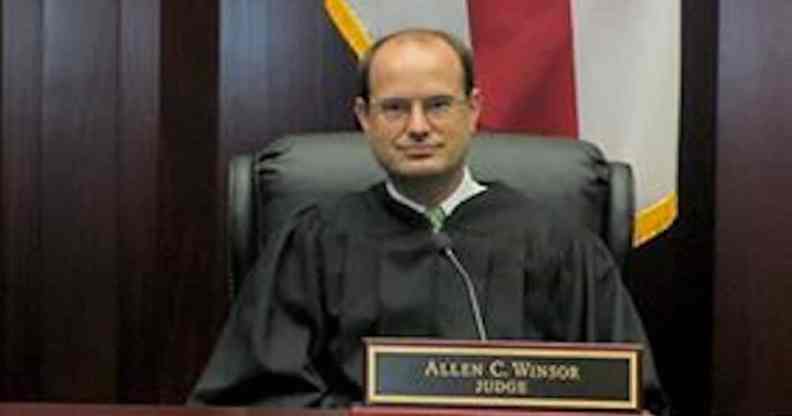Judge deciding fate of Florida’s ‘Don’t Say Gay’ backed ban on same-sex marriage

Judge Allen Winsor who backed Florida’s ‘Don’t Say Gay’ law, will preside over Disney’s lawsuit against Republican Ron DeSantis. (Facebook/ Florida Bar)
The judge who will decide the fate of Florida’s ‘Don’t Say Gay’ legislation, appointed by Donald Trump, previously tried to keep same-sex marriage illegal in the state.
Florida’s ‘Don’t Say Gay’ bill, which bans the discussion of LGBT+ topics in classrooms from kindergarten to third grade, was signed into law by the state governor Ron DeSantis on Monday, 28 March.
For children from fourth grade onwards, the bill bans these topics if they are not “age appropriate” or “developmentally appropriate”, although the bill gives no definitions for these terms.
On Thursday (31 March), an 80-page complaint was filed in US District Court by a group of LGBT+ students and families in Florida, alongside LGBT+ rights groups Equality Florida, Family Equality, the National Center for Lesbian Rights, alleging that the legislation is unlawful.
According to The Independent, the complaint insists that ‘Don’t Say Gay’ is an “unlawful attempt to stigmatise, silence, and erase LGBTQ people in Florida’s public schools”, and that is violates the First Amendment, the right to free speech, and the Fourteenth Amendment, which guarantees equal protection under law, as well as protections for LGBT+ students under Title IX.
The lawsuit states: “This effort to control young minds through state censorship – and to demean LGBTQ lives by denying their reality – is a grave abuse of power.”
While the lawsuit appears to have a strong case, it has now emerged that it will be presided over by Trump-appointed US District Judge Allen Winsor, who fought to keep Same-sex marriage illegal in Florida.
Winsor was appointed as judge of the United States District Court for the Northern District of Florida by Trump in 2019.
From 2013 to 2016, he served as Solicitor General of Florida in the Florida Attorney General’s office, during which time he was involved in two cases brought by a group of 10 same-sex couples who wanted to be legally married.
According to The Leadership Conference on Civil and Human Rights, which opposed Winsor’s confirmation in 2019, he defended Florida’s ban on same-sex marriage, which was implemented in 1977.
In a brief, he argued that there was “a clear and essential connection between [heterosexual] marriage and responsible procreation and childrearing,” and that heterosexual marriage is more likely to result in “stable and enduring family units” than same-sex marriage.
He also insisted that “disrupting Florida’s existing marriage laws would impose significant public harm”.
His arguments were described at the time by US District Judge Robert Hinkle as “an obvious pretext for discrimination”, and were dismissed.
According to the conference, Winsor also fought against reproductive rights, environmental protections and gun safety measures.

